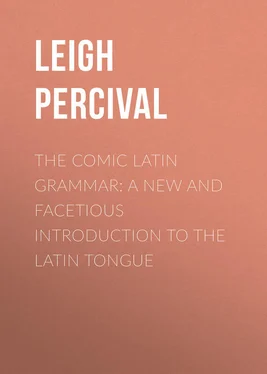Percival Leigh - The Comic Latin Grammar - A new and facetious introduction to the Latin tongue
Здесь есть возможность читать онлайн «Percival Leigh - The Comic Latin Grammar - A new and facetious introduction to the Latin tongue» — ознакомительный отрывок электронной книги совершенно бесплатно, а после прочтения отрывка купить полную версию. В некоторых случаях можно слушать аудио, скачать через торрент в формате fb2 и присутствует краткое содержание. Жанр: foreign_prose, foreign_humor, на английском языке. Описание произведения, (предисловие) а так же отзывы посетителей доступны на портале библиотеки ЛибКат.
- Название:The Comic Latin Grammar: A new and facetious introduction to the Latin tongue
- Автор:
- Жанр:
- Год:неизвестен
- ISBN:нет данных
- Рейтинг книги:5 / 5. Голосов: 1
-
Избранное:Добавить в избранное
- Отзывы:
-
Ваша оценка:
- 100
- 1
- 2
- 3
- 4
- 5
The Comic Latin Grammar: A new and facetious introduction to the Latin tongue: краткое содержание, описание и аннотация
Предлагаем к чтению аннотацию, описание, краткое содержание или предисловие (зависит от того, что написал сам автор книги «The Comic Latin Grammar: A new and facetious introduction to the Latin tongue»). Если вы не нашли необходимую информацию о книге — напишите в комментариях, мы постараемся отыскать её.
The Comic Latin Grammar: A new and facetious introduction to the Latin tongue — читать онлайн ознакомительный отрывок
Ниже представлен текст книги, разбитый по страницам. Система сохранения места последней прочитанной страницы, позволяет с удобством читать онлайн бесплатно книгу «The Comic Latin Grammar: A new and facetious introduction to the Latin tongue», без необходимости каждый раз заново искать на чём Вы остановились. Поставьте закладку, и сможете в любой момент перейти на страницу, на которой закончили чтение.
Интервал:
Закладка:
COMIC LATIN GRAMMAR
Of Latin there are three kinds: Latin Proper, or good Latin; Dog Latin; and Thieves’ Latin, Latin Proper, or good Latin, is the language which was spoken by the ancient Romans. Dog Latin is the Latin in which boys compose their first verses and themes, and which is occasionally employed at the Universities of Oxford and Cambridge, but much more frequently at Edinburgh, Aberdeen, and Glasgow. It includes Medical Latin, and Law Latin; though these, to the unlearned, generally appear Greek. Mens tuus ego – mind your eye; Illic vadis cum oculo tuo ex – there you go with your eye out; Quomodo est mater tua? – how’s your mother? Fiat haustus ter die capiendus – let a draught be made, to be taken three times a day; Bona et catalla – goods and chattels – are examples.
Thieves’ Latin, more commonly known by the name of slang, is much in use among a certain class of conveyancers , who disregard the distinctions of meum and tuum. Furthermore, it constitutes a great part of the familiar discourse of most young men in modern times, particularly lawyers’ clerks and medical students. It bears a very close affinity to Law Latin, with which, indeed, it is sometimes confounded. Examples: – to prig a wipe – to steal a handkerchief. A rum start – a curious occurrence. A plant – an imposition. Flummoxed – undone. Sold – deceived. A heavy swell – a great dandy. Quibus, tin, dibs, mopuses, stumpy – money. Grub, prog, tuck – victuals. A stiff-’un – a dead body – properly, a subject. To be scragged – to suffer the last penalty of the law, &c.
All these kinds of Latin are to be taught in the Comic Latin Grammar.
If Toby, the learned pig, had been desired to say his alphabet in Latin, he would have done it by taking away the W from the English alphabet. Indeed, this is what he is said to have actually done. The Latin letters, therefore, remind us of the greatest age that a fashionable lady ever confesses she has attained to, – being between twenty and thirty.
Six of these letters are called what Dutchmen, speaking English, call fowls – vowels; namely, a, e, i, o, u, y.
A vowel is like an Æolian harp; it makes a full and perfect sound of itself. A consonant cannot sound without a vowel, any more than a horn (except such an one as Baron Munchausen’s) can play a tune without a performer.
Consonants are divided into mutes, liquids and double letters; although they have nothing in particular to do with funerals, hydrostatics, or the General post office. The liquids are, l, m, n, r; the double letters, j, x, z; the other letters are mutes.
“Hye dum, dye dum, fiddle dumb – c.” – Sterne.
A syllable is a distinct sound of one or more letters pronounced in a breath, or, as we say in the classics, in a jiffey.
A diphthong is the sound of two vowels in one syllable. Taken collectively they resemble a closed fist – i.e. a bunch of fives . The diphthongs are au, eu, ei, æ, and œ. Of the two first of these, au and eu, the sound is intermediate between that of the two vowels of which each is formed. This fact may perhaps be impressed upon the mind, on the principles of artificial memory, by a reference to a familiar beverage, known by the name of half-and-half. In like manner, ei, which is generally pronounced i, and æ and œ, sounded like e, may be said to exhibit something like an analogy to a married couple. The human diphthong, Smith female + Brown male, is called Brown only.
The reason, says the fool in King Lear, why the seven stars are no more than seven – is a pretty reason – because they are not eight. This is a fool’s reason; but we (like many other commentators) cannot give a better one, why the Parts of Speech are no more than eight – because they are not nine. They are as follow:
1. Noun, Pronoun, Verb, Participle – declined.
2. Adverb, Preposition, Conjunction, Interjection – undeclined. Most schoolboys would like to decline them altogether.
OF A NOUN
A noun is a name, – whether it be a Christian name, or a sur-name – the name of a prince, a pig, a pancake, or a post. Whatever is – is a noun.
Nouns are divided into substantives and adjectives.
A noun substantive is its own trumpeter, and speaks for itself without assistance from any other word – brassica, a cabbage; sartor, a tailor; medicus, a physician; vetula, an old woman; venenum, poison; are examples of substantives.
An adjective is like an infant in leading strings – it cannot go alone. It always requires to be joined to a substantive, of which it shows the nature or quality – as lectio longa, a long lesson; magnus aper, a great boar ; pinguis puer, a fat boy; macer puer, a lean boy. In making love (as you will find one of these days) or in abusing a cab-man, your success will depend in no small degree in your choice of adjectives.
NUMBERS OF NOUNS
Be not alarmed, boys, at the above heading. There are numbers of nouns, it is true, that is to say, lots; or, as we say in the schools, “a precious sight” of nouns in the dictionary; but we are not now going to enumerate, and make you learn them. The numbers of nouns here spoken of are two only; the singular and the plural.
The singular speaks but of one – as later, a brick; faba, a bean; tuba, a trump (or trumpet); flamma, a blaze; æthiops, a nigger (or negro); cornix, a crow.
The plural speaks of more than one – as lateres, bricks; fabæ, beans; tubæ, trumps; flammæ, blazes; æthiopes, niggers; cornices, crows.
Here it may be remarked that the cynic philosophers were very singular fellows.
Also that prize-poems are sometimes composed in very singular numbers .
CASES OF NOUNS
Nouns have six cases in each number, (that is, six of one and half a dozen of the other) but can only be put in one of them at a time. They are thus ticketed – nominative, genitive, dative, accusative, vocative, and ablative.
The nominative case comes before the verb, as the horse does before the cart, the “lieutenant before the ancient,” and the superintendant of police before the inspector. It answers to the question, who or what; as, Who jaws? magister jurgatur, the master jaws.
The genitive case is known by the sign of, and answers to the question, whose, or whereof; as, Whose breeches? Femoralia magistri – the breeches of the master, or the master’s breeches.
The dative case is known by the signs to or for, and answers to the question, to whom, or to or for what; as, To whom do I hold out my hands? Protendo manus magistro – I hold out my hands to the master.
In this place we are called upon to consider, whether it be more agreeable to have Latin or the ferula at our fingers’ ends .
Observe that dative means giving . Schoolmasters are very often in the dative case – but their generosity is chiefly exercised in bestowing what is termed monkey’s allowance; that is, if not more kicks, more boxes on the ear, more spats, more canings, birchings, and impositions, than halfpence.
The accusative case follows the verb, as a bailiff follows a debtor, a bull-dog a butcher, or a round of applause a supernatural squall at the Italian Opera. It answers to the question Whom? or What? as, Whom do you laugh at? (behind his back) Derideo magistrum – I laugh at the master.
The vocative case is known by calling, or speaking to; as, O magister – O master; an exclamation which is frequently the consequence of shirking out, making false concords or quantities, obstreperous conduct in school, &c.
The ablative case is known by certain prepositions, expressed or understood; as Deprensus magistro – caught out by the master. Coram rostro – before the beak . The prepositions, in, with, from, by, and the word, than, after the comparative degree, are signs of the ablative case. In angustiâ – in a fix. Cum indigenâ – with a native. Ab arbore – from a tree. A rictu – by a grin. Adipe lubricior – slicker than grease.
Читать дальшеИнтервал:
Закладка:
Похожие книги на «The Comic Latin Grammar: A new and facetious introduction to the Latin tongue»
Представляем Вашему вниманию похожие книги на «The Comic Latin Grammar: A new and facetious introduction to the Latin tongue» списком для выбора. Мы отобрали схожую по названию и смыслу литературу в надежде предоставить читателям больше вариантов отыскать новые, интересные, ещё непрочитанные произведения.
Обсуждение, отзывы о книге «The Comic Latin Grammar: A new and facetious introduction to the Latin tongue» и просто собственные мнения читателей. Оставьте ваши комментарии, напишите, что Вы думаете о произведении, его смысле или главных героях. Укажите что конкретно понравилось, а что нет, и почему Вы так считаете.



![Theresa Cheung - The Dream Dictionary from A to Z [Revised edition] - The Ultimate A–Z to Interpret the Secrets of Your Dreams](/books/692092/theresa-cheung-the-dream-dictionary-from-a-to-z-r-thumb.webp)








